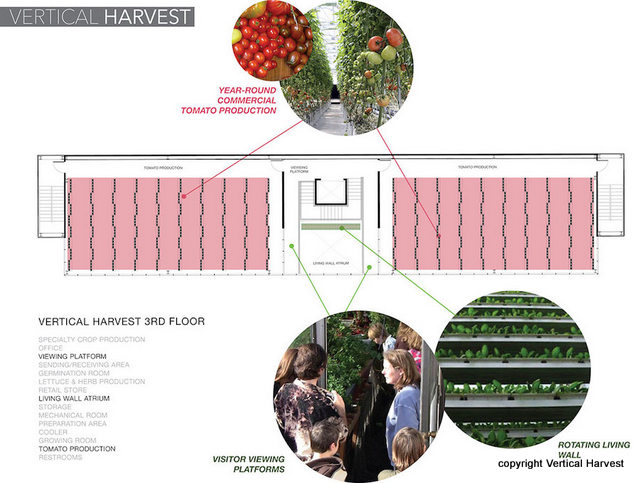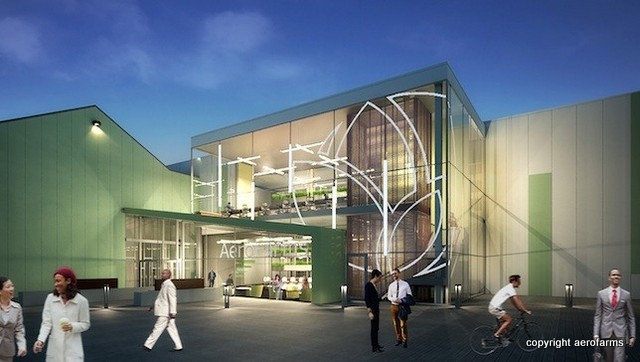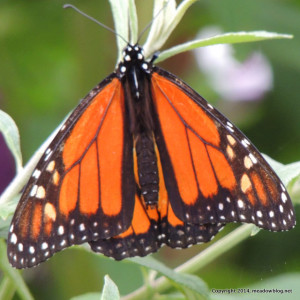“The biggest shipping container restaurant in the United States will open this spring in Asheville, North Carolina.”
Read more here.
See additional articles on container buildings here.

“The biggest shipping container restaurant in the United States will open this spring in Asheville, North Carolina.”
Read more here.
See additional articles on container buildings here.
 “High-yield, vertical greenhouses could be a godsend for outlying regions afflicted with harsh climates, where food supply chains are weather-vulnerable.” Jackson, Wyoming, where 400 inches of snow falls per year, is constructing a three-story, 13,500 square foot hydroponic greenhouse. See the article here.
“High-yield, vertical greenhouses could be a godsend for outlying regions afflicted with harsh climates, where food supply chains are weather-vulnerable.” Jackson, Wyoming, where 400 inches of snow falls per year, is constructing a three-story, 13,500 square foot hydroponic greenhouse. See the article here.
 This $30 million project is underway now in New Jersey’s largest city. A former steel factory is being converted into the largest indoor vertical farm in the world, according to an announcement today from an investment group backing the development. The investors have partnered with Newark city officials and the New Jersey Economic Development Authority to convert the 69,000 square foot facility in the Ironbound section of Newark.
This $30 million project is underway now in New Jersey’s largest city. A former steel factory is being converted into the largest indoor vertical farm in the world, according to an announcement today from an investment group backing the development. The investors have partnered with Newark city officials and the New Jersey Economic Development Authority to convert the 69,000 square foot facility in the Ironbound section of Newark.
Once completed, the facility will be able to produce about two million pounds of green vegetables and herbs each year. It will partially open in the second half of this year, the group said. Organizers plan to bring 78 jobs to the city by the end of 2015. Read all about it here.
 In a new report, Peeling Back the Eco-Labels: A Comparison of FSC and SFI Forest Certification Program Audits in Canada, ForestEthics quantifies the ways in which the SFI auditing system is weaker and less transparent than that of the FSC (Forest Stewardship Council) by studying the two systems in Canada.
In a new report, Peeling Back the Eco-Labels: A Comparison of FSC and SFI Forest Certification Program Audits in Canada, ForestEthics quantifies the ways in which the SFI auditing system is weaker and less transparent than that of the FSC (Forest Stewardship Council) by studying the two systems in Canada.
Read the article by Bill Walsh in Healthy Building News
Last week, at the 19th annual Plant-o-Rama, a symposium and trade show held by the Brooklyn Botanical Garden, the keynote speaker, an ecologist, told the crowd that beauty is not enough.
 “We have to raise the bar on our landscapes,” said Mr. [Douglas] Tallamy, a professor and chairman of the department of entomology and wildlife ecology at the University of Delaware. “In the past, we have asked one thing of our gardens: that they be pretty. Now they have to support life, sequester carbon, feed pollinators and manage water.”
“We have to raise the bar on our landscapes,” said Mr. [Douglas] Tallamy, a professor and chairman of the department of entomology and wildlife ecology at the University of Delaware. “In the past, we have asked one thing of our gardens: that they be pretty. Now they have to support life, sequester carbon, feed pollinators and manage water.”
I’ve been part of the NJMC’s Parks Group for more than 20 years and this has always been our mission. From the earliest days at DeKorte Park, we have carefully selected plants to attract and support wildlife, control erosion, teach environmental education, be self-sustaining, AND be beautiful. It wasn’t easy back in the late 1980s when many native plants were simply not available in nurseries. Natives have gained a lot ground (pun intended) since then, and it’s great to know that the nursery industry is hearing the message.
Read the full NYTimes article.